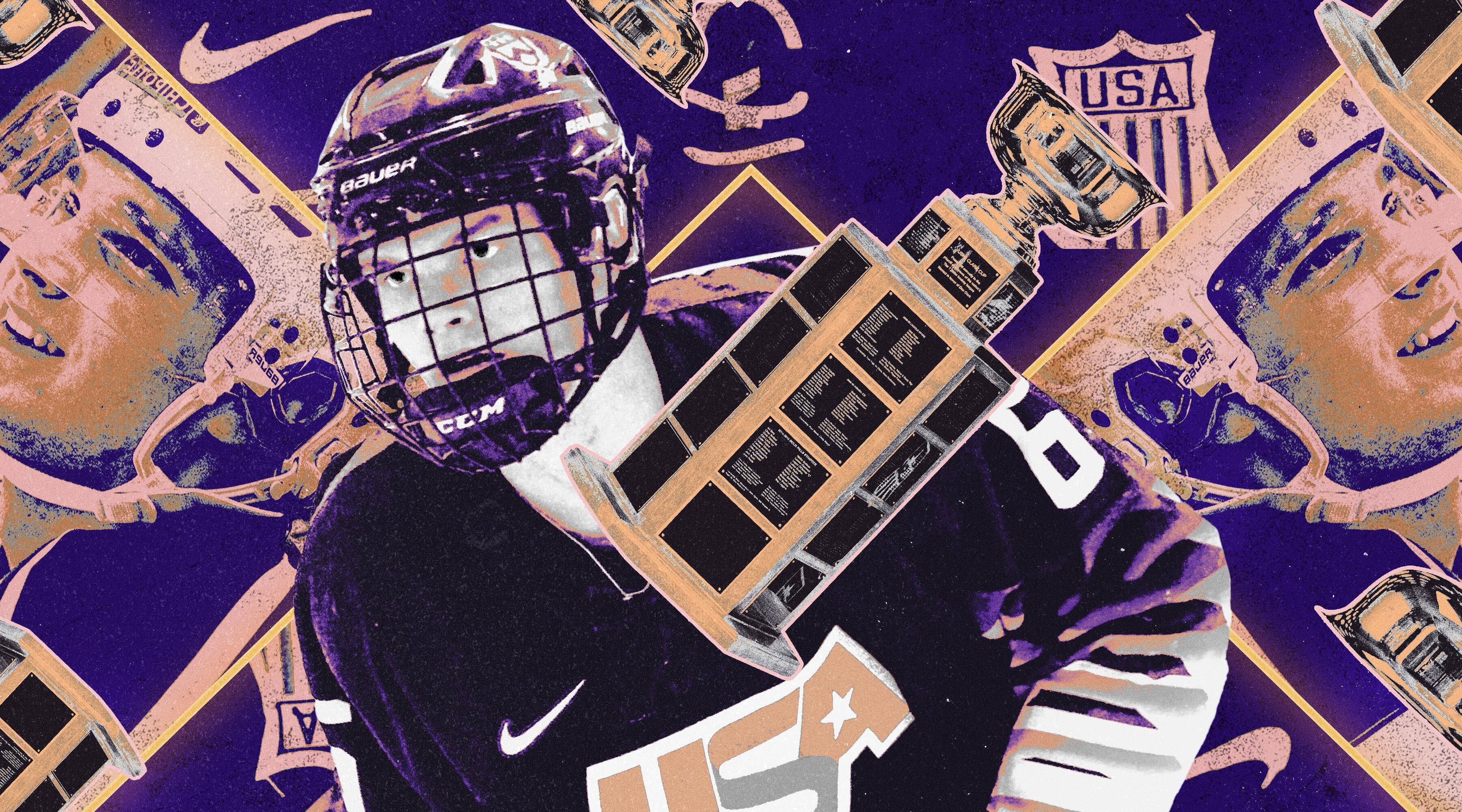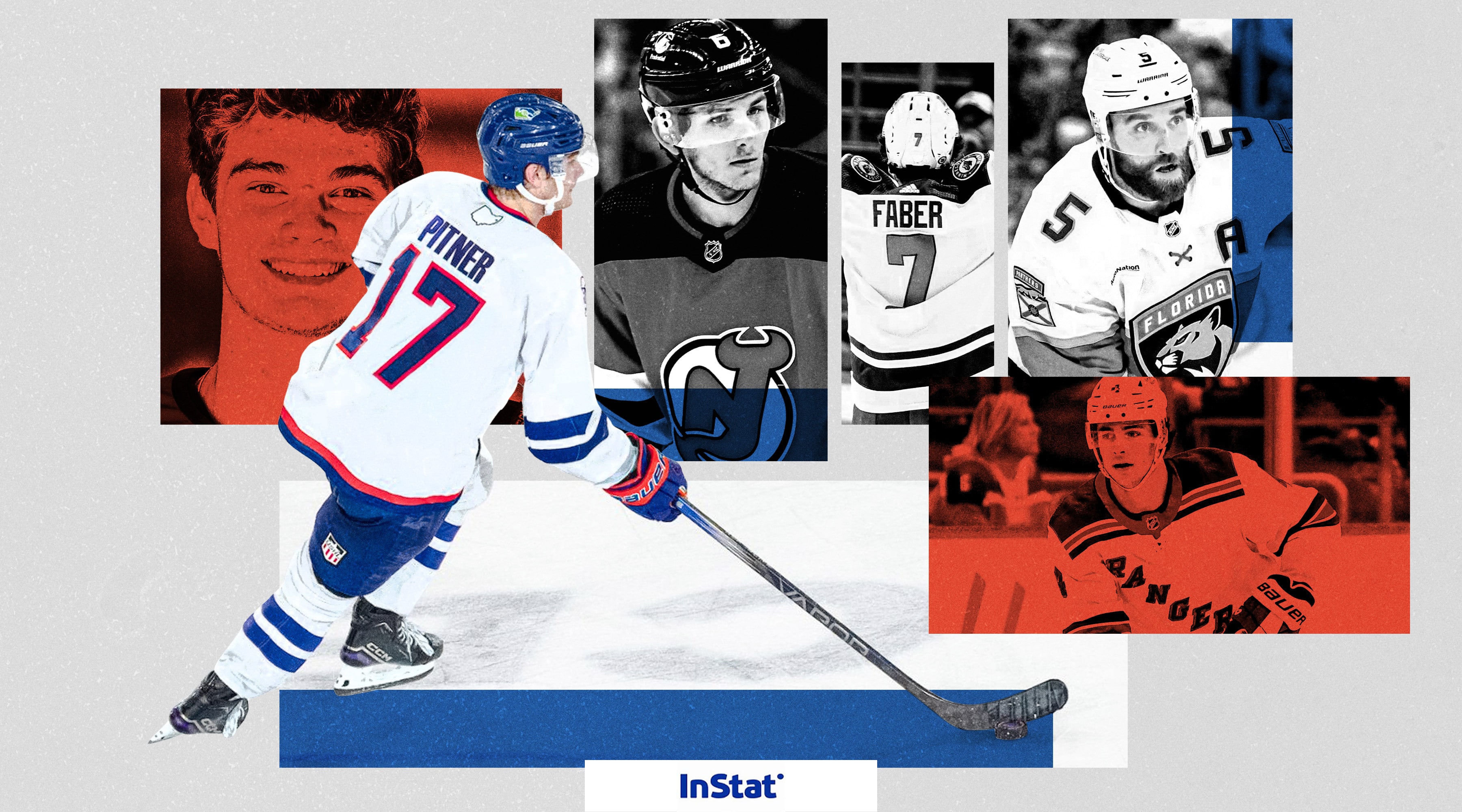By this point in these draft profiles, I've talked a lot about defensive defensemen who seem to have some mix of potential upside but also red flags/risk in their offensive projection. There is a reason why, and while I've touched on why before, it's worth re-emphasizing that... [waves hand in the general direction of the Toronto Maple Leafs' defense the past few years].
Suffice to say, I've been adjusting my viewpoint on what makes a good NHL defenseman.
This is the kind of defenseman I think can be both in demand but also underrated, mostly because I think projecting defense-first guys is the most difficult thing to do. Maybe outside of goaltending, anyways. The defenseman I've already profiled that fit this type, to varying degrees, already have a good deal of hype. To me, this is because the balance of their present defensive ability, physical tools, or offensive projections are recognized to be at very high levels.
But there are always guys who fall through the cracks, either to later rounds who become "steals" or who go undrafted entirely. Matt Roy, Vladislav Gavrikov, Jacob Middleton, Gustav Forsling, and Ryan Graves are all mid to late round picks. Then there's guys like Zach Whitecloud, or heck even Simon Benoit, who are examples of guys who went undrafted altogether.
And one of the best examples of a defenseman of this type is John Marino, and he is a very important and relevant name when discussing Tory Pitner as a potentially underrated defense-first prospect. So let's talk about him.
THE BASICS: STATS AND CONTEXT
- Position: Right-shot defenseman
- League(s): USHL
- Height: 6'1"
- Weight: 183 lbs
- Birthdate: March 6th, 2006
Here are his draft rankings, as of writing this:
- Bob McKenzie: Unranked
- Will Scouch: Unranked
- Elite Prospects: 80th
- Scott Wheeler: Unranked
- Dobber Prospects: Unranked
- FC Hockey: Unranked
- McKeen's Hockey: 74th
Pitner as a defenseman seems like he has always been right on the periphery of stardom, as far as teenage prospects go. The year before he was drafted into the USHL (2021-22), he finished 10th in his league in points per game by defensemen. But he was already a pretty big kid and was said to be mature and defensively sound for his age, and he wound up being taken by Youngstown 9th overall in the USHL Phase I draft in the summer of 2022. Technically he was taken even higher, as some teams picking before 9th overall gave up their picks to sign high profile import players.
In 2022-23, Pitner split the season between an U18 AAA league and made his USHL rookie debut. He played 36 games for the eventual USHL champions last year, as well as all 9 of their playoff games. He had 9 points in those 36 regular season games, and no points in his 9 playoff games. As a 16 year old rookie defenseman in a lower scoring league than the CHL typically is, it wasn't bad offensive production. But it sure wasn't 'elite' offense for a defender either. His bread and butter was still his defence.
This season, in 2023-24, Pitner improved his production to 24 points in 50 games and then added one point in 7 playoff games. That was good for 5th among all U18 defensemen in the league, which again is not bad, but is well off the level you'd expect from a future star offensive defenseman. A lot of his production came at even strength, and in the first half of the season when they were missing their top offensive guy. Even when they couldn't ice their best roster, Pitner was not used as a top PP quarterback. That fell to Andrew Strathmann, who is a year older, or the younger Swedish phenom Sascha Boumedienne who will likely be ranked as a first-round prospect in next year's draft. But at the start of the year, when Strathmann was hurt and Boumedienne was still finding his feet as a USHL rookie, Pitner got more PP time and offensive usage and had a mini-breakout in the first two months.
Tory Pitner (2024) has been really impressive this season. Here he is skating into the offensive zone, and ripping a missile from the slot into the back of the net. His sixth of the year. @YtownPhantoms @FloHockey pic.twitter.com/QsJcBsSiVt
— Ryan Sikes (@ryan_sikes10) November 11, 2023
Pitner also served as the assistant captain for Youngstown, and was a staple of their top pairing through the season. Youngstown still had a very good team in the USHL even if they lost some of their top players from their championship run the year before.
Pitner's level of play was recognised enough to play for Team USA in some of the international tournaments that they consider to be... less important. For the World U18s and World Juniors, they bring their best squad made up almost entirely of their US NTDP roster. But for things like, say, the Hlinka Gretzky or World U19 Junior A Challenge, then they typically bring the "best of the rest" from the non-NTDP teams in the USHL, and the top players from US high schools or other leagues. So you can consider Pitner to be considered one of the best players on America's second best team of prospects. At the Hlinka, Pitner was the Captain. At the WJAC's U19 team, he was still one of their most relied upon defensemen despite being on the younger side.
So the picture you should have of Pitner is someone who coaches really like and will rely upon heavily when it matters. He may not be among the very best defensemen in his age group because he lacks the higher level offensive skills, but, he gets strong reviews for his reliability on defense.
And that is because Pitner is obsessed with defensive details.

THE GOOD: CEREBRAL DEFENSE, PUCK MOVEMENT
So before I start talking scouting reports and details, I want to share two interviews that Elite Prospects had that were with Tory Pitner himself. They talked almost entirely about defense at a fascinating level of detail that I am not used to seeing discussed so candidly and casually bantered about. If you have an EP Rinkside subscription, I recommend reading both entirely. If you don't, you'll have to settle for the snippets I quote below. But they are a great insight into the level of attention, time, and work that Pitner puts into playing high level defense.


This cerebral attention to detail on defense is Pitner's greatest strength, and why I think he projects so well to the NHL. He was arguably the best defensive defensemen in the USHL this year, and in just about any way you can think of. When he was asked who in the NHL he compares himself to/wants to emulate, his answer was John Marino. Which, honestly.... yeah, I usually don't like comparables but that seems like a good one both in terms of stylistic similarities but also as a goal to aspire to for Pitner.
A lot of what drives Pitner's defensive ability is his 'hockey sense', which is a very nebulous term but in this case it means he just gets hockey. He studies it a lot, he has a brain for the game that can think and act very quickly on the fly, but also anticipates play well.
Pitner was elite at denying zone entries, and he goes into the specifics of what he is trying to do even against the very best puck carriers in his league. Normally I don't like sharing quotes this long, but in this case I think it's worth sharing his whole answer after he was asked to describe his process on defending against transitions:
It starts with knowing who I'm playing against, what they like to do, and what their systems are. For example, we play (top 2024 NHL Draft prospect) Michael Hage often. He's dynamic off the rush. I know he wants to do a lot of high-end stuff: Cutting east, cutting west, weight shifts, etc.
Knowing that whenever Hage or (his linemates) Mick Thompson or Charlie Major, get the puck, I want to try to create some false gap to the middle. Meaning, make them think their only option is to the outside. Visually, just trying to make them think I'm taking away the middle as much as possible, but I'm really inviting them where I want to go.
From there, it's stick detail, like whether my palm is up or down. Maybe try to show my backhand and take away a few extra seconds of space. Those higher-end guys are fearless about going through sticks, so I want to be in a position where they can't walk through it. It's very rare to see a poke check in transition [at this level], but I want to hide my stick so they get too close, and that's when I can deflect the puck into the corner or tip it.
Do we have numbers? Where am I? Where are they? Do they have speed? Do I have speed? And from there, match their speed, getting at a 45-degree with them – right where I want them to be so I can go either way. Hopefully, they'll try to take me wide, and I can turn and close and get in front of their shoulders so they can't use my momentum.
A lot of people talk about big hits, but it's pretty hard to hit those higher-end guys with how shifty and skilled they are. Instead, it's about getting body positioning and forcing them to run into you; making them make the first move and taking it from there.
Another fascinating section in these interviews was the idea of 'avoiding the second battle', which basically means knowing what to do with the puck once you get it back from a good defensive play. Basically, don't be the guy that can make a stop and then turn it over back to the other team or give up possession right away so you have to keep defending.
Sorry, just had some traumatic flashbacks I had to work through. Not related to any of that, I promise.
So this is where I like the potential for Pitner "offensively", though really it helps as much if not more drive good defensive numbers. Once he gets a stop, he has a good ability to make a good, smart and effective play to transition from defense to offense and avoid that 'second battle'. He makes good decisions with the puck and has a good ability to evade the initial pressure and make the first pass.
From Upside Hockey:
His vision and IQ may not be elite, but they are good enough to give him the ability to spot developing opportunities for teammates through a crowd, and the patience to hold on to the puck until he can open a seam to pass through. He carries a fair amount of puck-skill and playmaking ability, and can connect on difficult passes, even cross-ice, or through traffic, and his skating and anticipation give him time and space to execute. He's a quality puck-mover, and is outstanding in transition, which is one of his specialties- he makes smooth, effortless retrievals, and then quarterbacks the play up the ice with sharp passing, or by carrying it out himself with speed.
THE FLAWS: OFFENSE, PHYSICAL TOOLS
For all of Pitner thinking and processing the game at a very high level, the big question mark I have about him is if his physical tools are at a high enough level to work in the NHL. His skating is good, but would need to be better. He has good size and plays physical, but he's not so big and strong that I think he could become physically dominant as a pro. At least, not without developing some Nylander or Kämpf-level buffness, and that's not something that just any NHL pro does.
There's also the question about Pitner's offensive upside. I'm more confident that his passing, from the perspective of moving the puck up the ice, can play up at higher levels. But even John Marino has three 25+ point seasons in the NHL, with no powerplay time. Pitner is going to have as much wiggle room in a potential pro career if he doesn't have offense at a high enough level, if his defense can't play up enough due to limited physical ability.
So he'll need to do a lot of work so he can improve in those two areas enough that they won't be liabilities in the NHL. It's not impossible, or even necessarily unlikely, but it's no slam dunk guarantee either. That's why, I think, he hasn't gotten a lot of hype as a prospect yet, compared to the other more defensively minded defensemen I've profiled already.
OVERALL ASSESSMENT
Despite those question marks, I do think that – as of writing this – Pitner is one of the more slept on prospects in this draft. That may change by the time everyone's final rankings come out, but I still think he may wind up as a third or even fourth round pick. If he does, I'd absolutely swing on him with Toronto's fourth rounder. If he does wind up being in an earlier range, he's someone I would still swing on if Toronto winds up with a third or even late second rounder through trade.
Bob McKenzie's most recent full rankings did not include Pitner at all, not even in his honourable mentions. There are only two scouting outlets I know of who rank him, and they're Elite Prospects (78th) and McKeen's (86th). The NHL Central Scouting listed him as 90th among North America skaters, making him very low. His season did not necessarily end on a high note, since most of his offensive production came in the early part of the season. He also did not play in the World U18s, since Team USA always brings their US NTDP squad with maybe one or two of the very best among the rest of the USHL or CHL players.
Pitner has the benefit of being committed to Denver in the NCAA. They are the reigning NCAA champions, and under their current coach have been a powerhouse in terms of winning, with two championships in three years despite not recruiting as many blue chip players like Michigan, Minnesota, or the Boston teams. They've done so by developing good but relatively unheralded prospects and playing really smart, structured hockey.
I'm just betting on Pitner's brain and current skills being something that be improved even further, and him having more offensive ability than he's shown so far. If you could get a John Marino in the middle rounds of the draft, wouldn't you go for that? That's a loaded question, but that kind of player is who Pitner could be. He may be a bit of a project, but I'd love to see what Toronto's development team could do with him.
Thanks for reading!
I put a lot of work into my prospect articles here, both for the draft and Toronto's prospects. I do it as a fun hobby for me, and I'd probably do it in some capacity even if PPP completely ceased to exist. But if you like reading my work, some support would go a long way! I pay for a few streaming services (CHL, NCAA, USHL, the occasional TSN options for international tournaments that are broadcast) to be able to reliably watch these prospects in good quality streams. I also pay for some prospect-specific resources, such as tracking data and scouting reports from outlets like Elite Prospects, Future Considerations, McKeen's Hockey, The Athletic, and more.
Being able to get paid for this helps me dedicate more time and resources to it, rather than to second/third jobs. And whatever money I make here, a lot of I reinvest back into my prospect work through in those streaming and scouting services. Like I said, I'd be doing whatever I can afford for this anyway, so any financial help I get through this is greatly appreciated!







